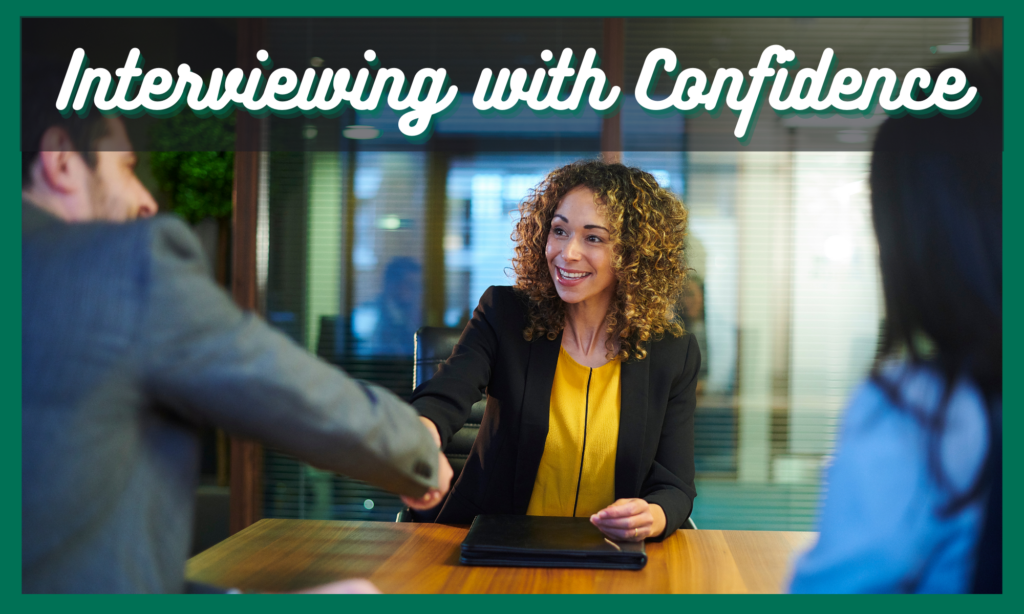Preparation and practice are key strategies to increase your confidence for any interview.


- Research the organization. Check out their website, social media pages, and do a quick Google search. Learning about them will help you tailor your answers to their mission and help you predict what they might want to ask about. Employee reviews on sites like Indeed or Glassdoor can also lend key insights. If you know who is interviewing you, you could also look them up on LinkedIn to learn a bit about where they are coming from.
- Ask about what to expect. Ask who you’ll be meeting with (could be one person, may be several) and if there is anything you should prepare. There are several kinds of interviews – check out these articles from LinkedIn to learn about Four Common Types of Interview Questions.
- Practice. This list of common questions is a great resource to role play an interview scenario with a friend or family member. Saying the answers out loud will help you prepare better and feel more comfortable in the actual interview. Visit the Job Interview Brightspace module to learn more about interviewing and the STAR Method for answering questions. Check out an example of a marketing job posting and the kinds of questions you might expect.
- Prepare your questions. The job description can be a useful tool for anticipating the kinds of questions or themes you may be asked about, or to help you develop question for the hiring committee. Every interview goes both ways, you are interviewing them as much as they’re interviewing you. Think about what you’d want to know about the position, the organization, the culture, measures of success, potential challenges, etc. Thoughtful questions will not only aide you in making an informed decision but can also effectively demonstrate your understanding of the position. Here are a few sample questions.
- Plan your outfit: You’ll want to dress to impress, but that does not mean the same thing in all fields, nor is it required that you conform to outdated gender roles. Do some research about what is appropriate, and then focus on a polished and thoughtful ensemble that makes your feel confident and comfortable. If in doubt seek advice from a trusted source, like your career center 😉
- Know where you are going.
- In Person: Consider visiting the building ahead of your interview so that you know where to park and how long it takes to get there. You may also want to ask for a phone number you can call the day off the interview, in case you encounter issues.
- Virtual: Make sure your technology is up-to-date and you know how to use the platform required. Do a practice call with a friend to familiarize yourself with the layout. Seek out a quiet space with minimal distractions (don’t forget to tell others in your house about your interview). And declutter your background. There is nothing more distracting than an unmade bed. Tidy up, adjust what can be seen in frame and consider a blurred background. Pro Tip: lighting should come from in front of you, not behind.
- If your interviewer is a few minutes late, just wait: They may be wrapping things up with someone else. After 5 minutes, chat, email or call them.
Check out our video guide to job interviews. This video details strategies before, during and after a job interview. Common questions and how to answer them are also covered.
Remember that you’re interviewing because they saw promise in you.
While it’s normal to feel nervous, we hope these steps can help you feel calm, confident, and curious during your interview. Remember that these future coworkers want to get to know you as a human so don’t be afraid to ask someone to repeat a question, elaborate on the question, or, after you answer, ask “Did I answer your question completely?”
Go in with 3 key things you want to be sure to convey
Consider your strengths (and areas for growth – you’ll probably be asked about that) and look for opportunities to highlight these skills. The NACE Competencies can help you focus on strengths sought by employers in all industries.
Tell concise stories
Prepare a couple good stories using the STAR method to answer questions in a concise, thoughtful and memorable way. Don’t assume that everyone has read your resume – in fact you may want to bring copies – so do make sure you are explaining your relevant experience as you answer questions. The goal is tell the story of who you are and how you’ve developed skills/experiences that prepare you for the position.
The video below lays out guidelines for a successful interview. The sessions ends with student questions at 1:00:27.
Send Thank You notes
Always. For real. To everyone who interviewed you. A short thank you note (often via email) is a demonstration of your interest, appreciation, and professionalism. Don’t wait, send it out 24-36 hours after your interview. It’s a great opportunity to mention anything that you forgot to mention in the interview or highlight a topic from the interview discussion you considered noteworthy. Check out some example thank you emails.
Take Care
Whew, you made it! Take a few more deep breaths (hopefully you’ve been breathing throughout!) and, if your interviewer asked for references as a next step, be sure let them know to expect a call.
Now you get to practice self-care and patience. Decisions can take longer than you think. That said, if the time frame the employer gave you for a decision has passed, it is perfectly fine to reach out to them with short, courteous email to continue the conversation. Example: “I’m writing to follow up on the timeline for (job title). I wanted to inquire about updates on the process and restate my interest in the position. Please do not hesitate to contact me if you need any additional information.”

